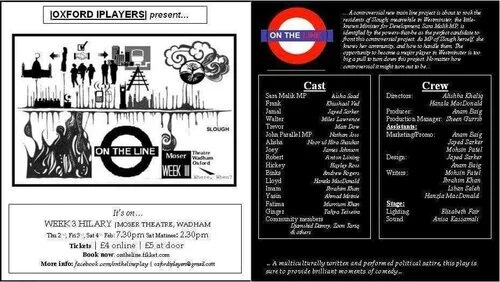On The Line - A Play by ISoc
Stage set for On The Line
“On the Line is very successful in capturing the very nature of politics – the dirty underhand moves, the power games, the back-stabbing and turning on the very hand that fed you. But the humour goes beyond just dark comedy and a satire of our political system – there is a lot of laugh-out-loud humour revolving around some very well thought out main and supporting characters”
During Week 3 Hilary Term 2012, the Moser theatre lit up and the stage was set for one of the most iconic events in recent ISoc history. Yes, 2012 saw ‘On the Line’, a political comedy, be performed by various members of the ISoc, alongside many from the wider Oxford University community. This event was yet another memorable landmark of the year 2011/12, being the first and only ever production led by the members of ISoc.
‘The play was inspired because many of us in ISoc were feeling creative’ said Hanzla, one of the producers of the play. ‘We came up with the idea of doing a play as a way of expressing ourselves and bringing an element of inclusivity to the society.’ Anam Baig was one of those drawn to the idea of an ISoc led play. ‘As someone with a Maths degree and absolutely no experience, I thought yes, I’ll get involved!’ she laughed. ‘I think it just felt so accessible and open.’ Anam thus embraced the role of being a co-producer of the play. Being the first event of its kind run by the society, Anam mentioned that ‘it was a huge undertaking’ and it’s clear that months of planning and dedication went into its production.
The first step was getting together a team of writers who began to conceptualise the plot of the play. Many ideas were thrown about before deciding the ultimate plot. It would be about Sara Malik, an MP representing her constituency, Slough. To the delight of the local Muslim community, she had vowed to preserve the wudhu area of the local masjid as it had been brought to her attention that it was the oldest functioning wudhu facility in the Western world. Meanwhile, the government are trying to push through the development of the HS2 despite the fact that its construction would require the demolition of the local Masjid that Sara had promised to protect. Sara has agreed to take on the project but is now forced to deal with the backlash and protest which has erupted within her constituency (led by the comedic local Imam). Torn between her loyalties to her constituents and her own political ambition, the play provided an interesting perspective on the political power-struggle and problems faced by a Muslim MP, and the relationship between local community interests and central government.
After deciding on the plot, the production team began the task of casting and arranging rehearsals. The cast was diverse, with a range of colleges and religions being represented, as many non-Muslims were also involved. Anam revealed that ‘organising rehearsals involved getting rooms 3 times a week. Co-ordinating such a sheer number of people, all from different colleges, was definitely quite difficult!’ In the end, a stellar cast was produced with ‘The Oxford Student’ review stating that the character of the Imam, played by Ibrahim Khan, deserves a special mention: ‘Not only was it an excellent performance, Ibrahim also has excellent timing and does great justice to the character of a stubborn, staunch community leader’- a description I’m sure we can all relate to… Aisha Saad’s portrayal of the main character, Sara Malik was also lauded: ‘Saad’s performance is good… perfectly capturing brash arrogance and political one-upmanship.’
Despite being given an impressive 3/5 star rating by The Oxford Student Review and having sell-out performances, Hanzla stressed that ‘we put on a play whose first merit was to be inclusive, experimental and fun to take part in. Not to produce the best piece of theatre Oxford had ever seen!’ Part of making it ‘experimental’ and encouraging creative inspiration meant a lot of improvisation was involved. As I learnt, this contributed to a degree of controversy as it’s difficult to moderate what is being said when it’s unscripted!
What I personally found to be most intriguing about the play was the huge diversity amongst those involved in its production and performance. As Ibrahim Khan told me, ‘It [the play] is not going to win any theatrical awards, but it was great fun and brought the entire ISoc together in a way I had never seen before. It also brought so many non-Muslims into the mix, and I think it was a great experience for them as well in getting them to work so closely with the members of the Oxford Muslim community.’ Hanzla further attested to this, adding that ‘we also had loads of Muslims who had never been involved in ISoc before.’ The play was thus a huge success, not only in performance but also in reuniting and reinvigorating the society. It attracted those who previously had little association with ISoc but subsequently found themselves feeling more welcome. Many of the non-Muslims involved in the play were also impressed by the creativity of the ISoc. One former member commented that there was envy amongst members of other societies at what ISoc had actually managed to pull off.
‘On the Line’ fulfilled its purpose, as intended by those involved in its creation. It attracted a wide range of new members to the society, who were inspired by the inclusivity and diversity of the ISoc. It uncovered the creative side of the ISoc, which perhaps hadn’t been focussed on before. Aisha Saad, the lead actor, summarised the success of the play. ‘I had long been keen to take part in a theatrical production, but never found roles that would be suitable for my lived identify as a practising and visible Muslim woman. Taking part in ‘On the Line’ was a highlight of my years at Oxford. The production team succeeded in making the entire process - from casting, to rehearsal, to the final curtain - inclusive, engaging and an absolute blast!’ The creative spirit of ISoc has continued to evolve and persists within our society to the present day, in the form of events such as the spoken word and poetry night. It is clear that those involved still have very fond memories of the play, and the fact that they would encourage a 2nd ISoc led play (yes please!) is a testament to the success of ‘On the Line.’
Written by
Maryam Amer, OUISoc Alumni Officer 2020
Programme for On The Line


